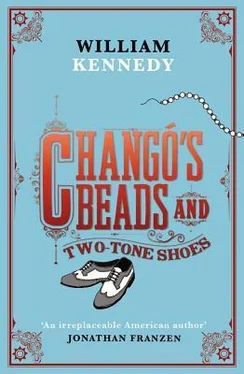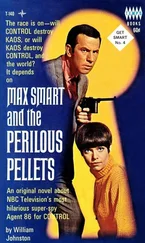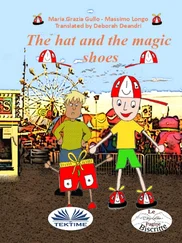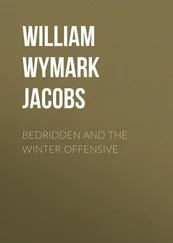But he changes the subject and says to Quinn, “It was great you got that lawyer. Roy called me about being busted, said he might get out on bail but didn’t know how much. Next thing, he taps me on the shoulder. You and Max make things happen.”
“Some things you can do so you do them. How are you and your lungs doing after all that exercise?”
“I’m holding. Didn’t fall over.”
“Bit of a generation gap here with Roy.”
“He’s in a hurry to forget things.”
“You don’t want to forget.”
“It’s so tough to get anyplace, you got to remember the moves. Big Jimmy, he was no coon. He owned that routine, turned it inside out, giant tapdancer, the singing shine, and he made it pay. He played coon like I play piano and he got someplace way beyond Coontown. He was big and he got bigger, he had clout. He opened that club and he took me in when I left New York. We blew a whole lot of jazz in his place and I turned a corner and down the road I got my own club.”
“What happened that you lost that record date in New York missing a train?”
“Didn’t miss any train. I cut a record with Brunswick, one session, eight tunes. I was going down to do eight more and then weed out the dogs, but the Brunswick big boys didn’t like my first takes. John Hammond calls me leavin’ the house, says you gotta know this, Sonny. They don’t want a second session, I’m sorry. So I missed the train.”
What they didn’t like was Cody’s timing — a little off on two cuts, speeded up, then fell back, but he’d been playing alone for months, no rhythm backup, could’ve been fixed, just give him a drummer. But he also blinked a few notes on two or three cuts, that won’t do. You had to be Art Tatum to sell solo piano records. They put a label on Sonny because he’s a little off one day, and it dogs him, and he’s at the bar and meets these cats comin’ through and they say, Here, Sonny, have a few, and they slip him some. He goes to his room and there’s a knock on the door, what are you doin’, man? I’m having a good time, he says, and they take him to the judge and somebody says he’s a dope pusher. I’m no pusher, judge, I was just way down and I met these cats and they gave me a few. Three months. My old gal Billie died a junkie. Cops busted her for possession and all she had was eighty-seven cents. Forty-four-year-old queen of the damn world with eighty-seven cents.
“Your ‘Blues for Fats’ was very fine. You recorded it?”
“New record coming this month. Hank O’Neal put it together.”
“I should write a piece on that. Anybody recording this concert?”
“I think Hank’s got it covered.”
Vivian reached across the table and touched Cody’s arm. “Cody, George has a request. When you go back to play could you do a waltz? George was a prize waltzer. Do you play waltzes?”
“For Georgie, sure I do.” And Cody went to the piano and welcomed all waltzers with “All Alone,” “When I Lost You,” and “Remember,” Cody in a sentimental mood.
George walked Vivian onto the floor and said, after we leave here I want to go to Van Woert Street and show you the trophies I won for waltzing. We’ll go tomorrow, Vivian said, and George guided her into his prize-winning moves, dancing on the balls of his feet, heels never touching the floor, because the judge puts straight pins in your heels and if you bend a pin you’re out. He put the back of his hand on the lady’s back (Vivian, is it?) so any sweat from his hand would not stain her dress, and he did his turns, the open strides, the reverses, which are always difficult and for some people impossible, but if you can’t reverse you’re out. He moved Vivian into the open rolls — toward her left, then her right — and holding her right hand with his left he circles backward, Vivian right with him, some things you do not forget, and after all she’d waltzed with George before, that night at Electric Park. George breaks, turns, recaptures and spins her, alone, then spins himself also to the rhythm of Cody’s brisk pacing, and they reunite with graceful ease in each other’s open arms; and on they glide across the floor, the stars of the evening.
At the table Renata put her hand on Quinn’s. “Your father is a wonderful dancer,” she said. “And Vivian reminds me of Ginger Rogers, with an extra twenty-five pounds.”
“He always said he danced better than Fred Astaire. My grandmother would always say, ‘You’re a damn fool.’”
“Dance with me,” Renata said.
“To a waltz?”
“I know the waltz. I didn’t like dancing but I learned it. My mother was a prize waltzer.”
“Ah, yes, so she was.”
Cody segued into “Shine” in waltz tempo (Quinn had never heard it played this way) and did three choruses, then jumped to another beat, which Quinn’s feet translated into a fox-trot. Cody stayed with “Shine” (making a statement are we?) and now Quinn realized this would be one of Cody’s epiphanies, when he takes dominion over a song, enters it, owns it, transforms it. Quinn stopped dancing and moved with Renata nearer to the piano to watch Cody’s hands, those long right middle fingers so straight, pointing the way into a serial revelation of what the song could become. Then Cody dropped in a new phrase, “I Ain’t Got Nobody,” not the tune, just the first four bars and he moved on, slowly, deep left-handed chords challenging the right, which rose to it with resonance, major to minor, very educated. There was beauty in his ease, his sureness, no clunked notes tonight, and he switches keys and ups the tempo, just a little, and ba-boom goes that left hand, the power of it, he’s on a ride, six choruses and counting, feel that beat, beat, beat, that goddamn beat, this is stride on high, stride the way it’s supposed to be, brilliant invention, the poor guy can’t help himself, smothering the song with his gift, exploding it, and Quinn’s pulse is up and cantering, those left-handed arpeggios, the glissando that surprises, and he notches the speed upward, I Ain’t Got, eight choruses and the left takes over, the right playing catch-up, and they level at a gallop, Cody humming his zum-zums now and Quinn counts and discovers the man is using twelve fingers, the left six doing that resonant bounce and the right a syncopated strut — how that Cody Mason does strut. He’s into his tenth chorus and running off limits into a double-and-a-half-time free-for-all, you can’t stop him, a driving two-note beat and both hands racing, right foot on the pedal, left foot keeping time with the universe, zum-zum za-za-zum-zum he’s a one-man band I Ain’t Got it’s a horserace between the hands and now Quinn counts fifteen fingers Cody kidnapped this piano and there’s no more dancing, no feet can move this fast, the crowd is cheering, applauding every breakaway they could never have imagined and Cody is burning, a man on fire with maniacal speed, inhuman precision, colossal invention — oh, yes, I Ain’t Got — and he coughs, he coughs, and he pauses, hits two chords with his left hand, one with his right, he stops.
The End.
He pulls his white silk handkerchief out of his lapel pocket and coughs into it, and everybody is standing, applauding, sending up screeches, cheers, hoots of joy and other eruptions that are rejoicings of what they can’t utter, salutes to the ineffable. Cody gets it, and he plunges his hand into his coat pocket, gripping the handkerchief. Quinn glimpses blood on it. Cody holds on to the piano, smiles at everybody, shakes his head to tell them it’s too much, he can’t stand it, but on and on goes the applause and Cody still has that smile. He can’t get rid of that smile. He always wears a smile. That’s why they call him Shine.

Читать дальше













